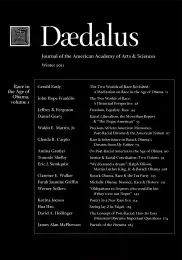Justice & Racial Conciliation: Two Visions
As we attempt to measure racial progress in America today and chart a path toward further progress, we should look to the vision of Martin Luther King, Jr. Barack Obama has also offered an influential vision of race in America that is similar to and inspired by King's. This essay compares King's and Obama's respective visions for race relations in U.S. society. Both men profess a commitment to racial equality and integration as fundamental ideals; and both provide an astute analysis of the racial realities of his day. However, Shelby's comparison of their visions reveals moral deficiencies in Obama's political philosophy, particularly with regard to the proposed way forward and the worthy principles that would have to be compromised on by following his path. Liberal pragmatism in matters of race may yield some social benefits, but not without moral costs.
Many Americans, from all racial backgrounds, are rightly proud that their nation has elected its first black president.1 In a society long weary of its race problem, such a momentous event has led some to assert that we have, definitively, realized Martin Luther King, Jr.’s dream. King, though still reviled in some quarters, is widely regarded as one of the founders of our new post-segregation republic. His interpretation of the American dream is a touchstone for measuring racial progress in the post–civil rights era. It is therefore an appropriate time to revisit Dr. King’s vision for race relations in U.S. society.
Indeed, Obama is frequently compared to King. Some of the comparisons flatter the president; others do not. However, I will not weigh side by side the personal character or practical achievements of the two men. Clearly, both leaders are highly educated and charismatic; both have a gift for oratory and the ability to inspire; and both have made indelible marks on U.S. history. But because of differences in their respective vocations–mass movement leader and minister, on the one hand; Democratic Party politician and elected official, on the other–and because Obama is operating within a very different historical context than did King, any such comparison is likely to be misleading and unfair. Yet we can reflect on, and learn from, these figures’ respective visions for American race relations. With this purpose in mind, I focus on ideas, on the philosophy that . . .
